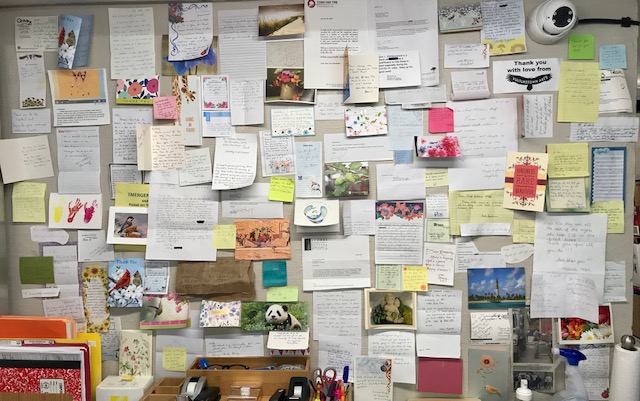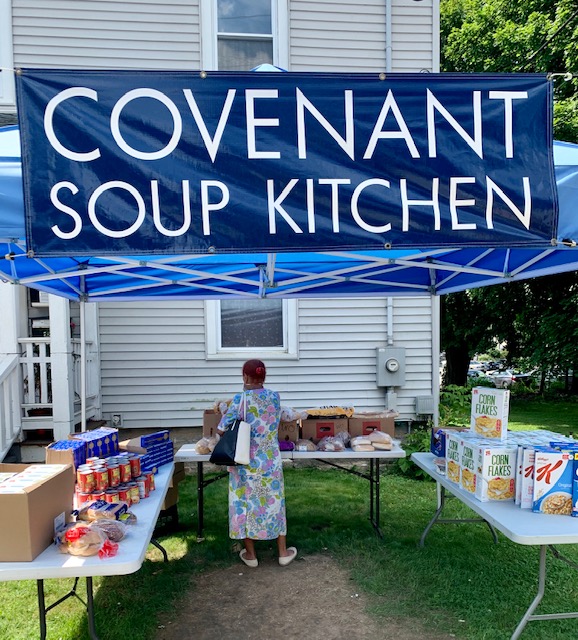- About Us
-
-
About Us
-
-
-

-
“This is an opportunity for our students to provide more for their families, for our students who may not have access to the resources that others do. It’s a blessing for the students who need that support.”
Randall Ward, Director of Student Services, Capital Community College in Hartford
-
- Find Help
- Ways to Give
- Volunteer
- Donate
- Partner Programs
News

Agency Spotlight: Covenant Soup Kitchen
31/Aug/20 / 09:24
Founded in 1981, Covenant Soup Kitchen (CSK) works to alleviate hunger and food insecurity in the greater Windham area. As needs in the area evolved, Covenant Soup Kitchen expanded to address them, growing from providing a monthly spaghetti dinner to an organization providing a comprehensive range of services and food seven days a week, year-round to support people in need. CSK has a focus on supporting people without homes.
CSK operates with a staff of three and a team of volunteers. “Thanks to their dedication, we have been able to stay open every day since the pandemic began and have not missed a meal,” said Kimberly Clark, Executive Director.
The soup kitchen serves breakfast and lunch daily and dinners on Friday evenings. The Emergency Food Pantry operates daily and now provides more meals per visit and includes morning and weekend hours to meet the needs of working families and those with school aged children.
Clark said Covenant Soup Kitchen is more than a place for a meal; it is a source of hope and comfort to guests who have fallen on hard times. “Through our care and advocacy, we attempt to improve the short- and long-term circumstances of each person.” The support is as varied as the individuals served and may include basic first aid, help with job searches, or providing items that cannot be purchased with SNAP or WIC benefits, like personal care items, diapers, and cleaning wipes.
When funds allow, CSK offers bus passes and laundry vouchers. “These vouchers are critical for our guests without housing to keep their clothing and bedding clean and dry while living outdoors when the seasonal homeless shelter is closed,” Clark noted.
Guests can get help completing paperwork for employment, housing, healthcare, and benefit programs and may use the agency’s telephones, printers, fax, and computers to conduct necessary business. Clark said hundreds of their guests use their address as a secure mailing address. “This is important for survivors of domestic violence and for those without stable housing.”

Covenant Soup Kitchen shifted from offering meals inside to a take-out model to prevent spread of COVID.
CSK coordinates with social service agencies to connect families to resources, including parenting support, domestic violence prevention, harm reduction, counseling, and rehabilitation programs. The goal is to help guests “move toward improved health and independence,” Clark said.
We asked Clark some questions about our partnership and the impact of the Coronavirus pandemic on the agency’s work.
Q: What are some of the most challenging things about your work right now? Have you seen a drop in volunteer participation?
A: We have been down to two staff members since the pandemic began and understandably many of our volunteers have not been able join us due to health concerns, school closings, and other challenges. We have had a small group of volunteers—many come every day—to make sure that we are able to provide the services our guests require. We continue to assist guests with employment searches, applications, and interview practice.
Q: What are the challenges created by social distancing? How have you overcome them?
A: We have never been an “arms-length” organization. It is difficult for our guests and for us to feel comfortable with the necessity of social distancing, but everyone has handled the transition beautifully, understanding that we need to protect those we care about.
Serving meals outdoors has been a tremendous challenge—from the unbudgeted expenses of coolers, tents, disposable utensils, to-go containers, and outdoor sanitation facilities to the added labor of packaging and serving outside in the elements. We also deliver meals remotely to guests without housing and to people in the community who have health, transportation, or mobility issues. There has been a significant increase in requests for this support since the pandemic began.
Q: What has been the most encouraging thing that you have seen at the soup kitchen since the pandemic began?
A: The guests and the way they care for one another—helping to deliver meals or pick up groceries for friends, neighbors and family; checking on those that have been unwell; and letting us know when someone needs our help.
The community has also always taken care of us, and the outpouring of support we experienced when the pandemic began was overwhelming—supplying donations of food, funds, facemasks, diapers, personal care items, and thankfully some new volunteers who have kept us afloat. We have created a literal wall of cards and notes of encouragement and support from community members in the emergency food pantry.

A “cheerleading wall” at CSK is a place to share thanks, messages of hope, and recognition for program participants and volunteers.
Q: What impact does the food from Connecticut Food Bank have on your work?
A: Without the donations of food from the community and the products available from Connecticut Food Bank, we simply would not be able to meet the needs of our guests. CFB staff came to our rescue at the very beginning of the pandemic when we were facing unprecedented requests for support and struggling with serving in a new way. CFB brought an emergency delivery of bags, hand sanitizer, and a few food items that we had run out of completely. When food donations cannot keep up with the quantity or variety we need, we know that CFB can fill any gaps. Every Friday morning you will hear our guests announcing, “THE TRUCK’S HERE! THE TRUCK’S HERE!” The guests always lend a hand unloading the truck and we all are grateful for the incredibly supportive CFB staff who always make sure we have what we need to continue our work! The CSFP Senior Food Box program provides additional food to senior citizens and enrollment has increased dramatically since 2015 from eight participants to 95 with an active waiting list.






